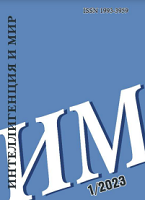"Интеллектуальная демобилизация" во франко-германских отношениях в 1920-е гг.: основные этапы, инструменты реализации, итоги
“Intellectual demobilisation” in the Franco-German relations of the 1920s: phases, instruments and results
Author(s): Iskander E. MagadeevSubject(s): Diplomatic history, Social history, Pre-WW I & WW I (1900 -1919), Interwar Period (1920 - 1939)
Published by: Ивановский государственный университет
Keywords: France; Germany; intellectuals; reconciliation; 1920s; Metzger; Grautoff; Rathenau; Gide; Desjardins; Sangnier;
Summary/Abstract: The article aims to define the key elements of the “intellectual demobilisation” in the Franco-German relations of the 1920s. The author proposes his version of the chronology of this process, demonstrates the essential means of the “intellectual demobilisation” and the forms of its realisation, finally, he gives a brief estimate of the results achieved by the end of the first post-WWI decade. By the “intellectual demobilisation”, this article conceives the variety of factors and circumstances linked to the activity of the social, cultural, lobbying organisations, the media, the intellectual associations aimed to lessen the level of mutual animosity and hostility between the French and German societies. Taking into account the paucity of the Russian historical research on this theme, the author tries to define the framework for the more detailed studies in the future. The research concludes that the process of “intellectual demobilisation” in the Franco-German relations of the 1920s developed in the non-linear way. The attempts of reconciliation were rather rare in the first post-WWI years. The perception of the mutual hostility between the French and the Germans dominated. The first ones, as the victors in the First World war, were regarded as revengeful, while the second ones, as the defeated side, were perceived as remaining aggressive and not prepared to bear the burden of the responsibility. The events of 1924-1925 which were marked by the efforts of the rapprochement between Paris and Berlin after the Ruhr crisis and culminated in the Locarno treaties, were critical. As the official contacts became warmer, the activities of French and German intellectuals received a new impulse. Nevertheless, by the beginning of the 1930s, the results of this process were contradictory, and the perspectives gave ground for anxiety. It is possible to notice that, even if the attempts to organise the “intellectual demobilisation” between France and Germany after 1918 were not doomed, by the end of the first post-WWI decade, their fruits were fragile, and the potential for further development was limited.
Journal: Интеллигенция и мир
- Issue Year: 2023
- Issue No: 1
- Page Range: 52-78
- Page Count: 27
- Language: Russian

